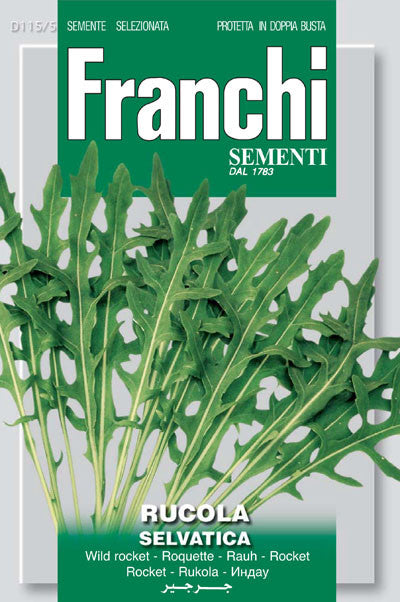PO Box 3908, Lawrence, KS 66046
seeds@growitalian.com
Call (785) 748-0959
Arugula/Rucola Selvatica-Wild Arugula (115-5)
Arugula/Rucola Selvatica-Wild Arugula (115-5)
Arugula/Rucola Selvatica-Wild Arugula (115-5)
Arugula/Rucola Selvatica-Wild Arugula (115-5)
Couldn't load pickup availability
Arugula Selvatica means Wild Arugula. Compared to Cultivated Arugula, it is slower growing, ready in about 50 days, with more deeply lobed leaves and a more pungent flavor. This is the type of Arugula (also called Rucola or Rocket) that grows wild in the countryside around Rome. Seeds of Arugula selvatica are much smaller than Arugula Coltivata seeds, so the packet weight is smaller but still contains a similar number of seeds. Arugula selvatica has 3,000 seeds per gram. Our 3-gram packet is about 9,000 seeds.
Arugula has been grown since Roman times, reputedly as an aphrodisiac, and is used widely in Italian cuisine. It's great as a salad ingredient, or simply eaten alone with a sprinkle of salt and a drizzle of olive oil. In Italy, it is often wilted over hot pizza or in pasta just before serving. Ischia, an island in the Bay of Naples, has a traditional digestif liqueur made from arugula, called rucolino. Arugula pesto is made just like basil pesto, and is a good substitute when the weather is too cold for basil. Arugula survives low temperatures and is usually the first and last salad green in the garden. Under row cover, it will survive all but the coldest winters.
Sprinkle seeds about an inch apart. Replant frequently for a long season of harvest. Our huge packets provide plenty of seed!
To see our growing guide for arugula, click here.
Share
Arugula/Rucola Selvatica-Wild Arugula (115-5)
Arugula/Rucola Selvatica-Wild Arugula (115-5)
Couldn't load pickup availability

I'm dissapointed. They are not growing as well as they should. The leaves never grew more than 2 ". I will try again growing another patch.
Loved this arugula, came up faster than predicted, kept growing despite funky weather here in Oregon. It continues to come up in succession planting with as much vigor as the first batch.
Here it is late November in Nova Scotia and I will be cutting Selvatica Rucola (arugula) for Sat. night pizza. This is one of many plantings since spring. This variety can not be be beat for both flavour and abundance. I got a lot of subsequent harvest from each planting, my farmers market customers loved it to, judging by how many bags they often bought.
Deborah
I have grown Sylvetta arugula for many years now and it is a perennial in my zone 6 Kansas garden. For some reason, most seed companies don't mention that. It self-seeds nicely and seedlings can be transplanted if you are careful (roots are somewhat sparse). I agree that it slower growing than annual varieties and somewhat coarser and stronger tasting. But it comes back very nicely when cut back hard so you can harvest it from frost to frost, and once you get it established, I find it's easier to grow than annual varieties that bolt so fast and hate the heat. To adjust for the stronger flavor, just chop the leaves finely and use less of it than milder annual types. I love the peanutty flavor undertones.
I grow 3 big pots of Rugula every seasons and pick them carefully through the summer; as long as I take care to just pick a few leaves off a plant and keep watering them regularly, they always grow back. I love picking a hand full of leaves and eat them straight or when I feel sophisticated, I toss in shaved aged Parmigiano, olive oil and Balsamico.
These particular variety is harder to grow then the Ortolani variety sold here. The leaves are tougher more fibrous. Eating them side by side, I think the wild one is a little stronger in flavour. It is definitely slower to sprout and slower in growing. The yield is not as good as well. I put a whole pack of seeds in a pot and not many sprouts come. The leaves look different, they are thinner, more lobed, and darker in color. The seeds are very small, like powder unlike the cultivated variety. I do like the difference and have always grown both kinds side by side.
I have also been experimenting with a mix of grow lights and keep them in door in winter. It works ok (not as well as outdoor in the season), but I can have Rugula salad in the winter.

